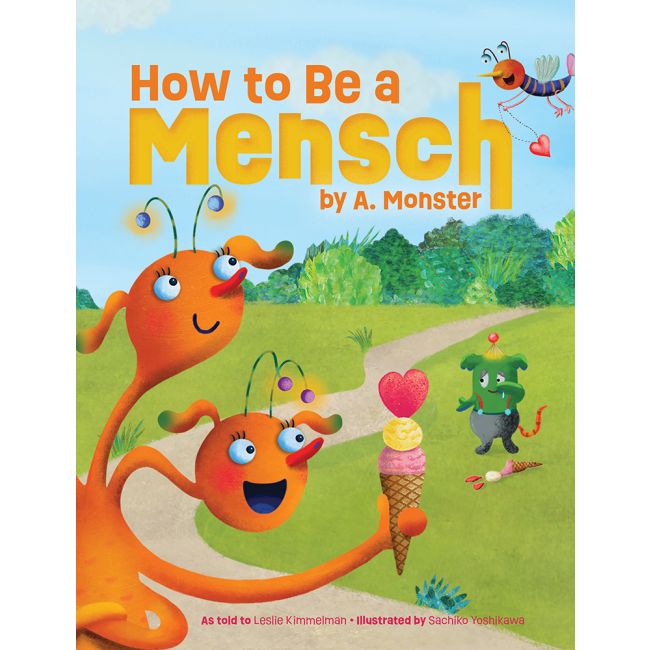How to Be a Mensch, by A. Monster
A bevy of colorful monsters demonstrate how they, too, can be mensches (creatures of integrity and honor) by treating others well. Includes a definition of the word mensch. "A cute and funny book with strong Jewish values" --Sarah Aronson, Sydney Taylor Shmooze
Weekly Torah portion study guide.
Quickly order multiple copies!
To see a full list of Parashat HaShavua booklets in alphabetical order, hover your cursor over “Hebrew in the menu above to show our expanded menus. The click on ‘Parashat HaShavua” under “Series” to show all available booklets in alphabetical order.
Do you prefer to see them by their order in the Torah? In the ‘Sort By” Box above the list of booklets, choose “Position.”
You can add all the booklets you need to your cart by clicking “Add to Cart” below each book image.
Need multiple copies? After clicking the “Add to Cart” button for each booklet you want to order, click on the shopping cart at the top of the screen. You can adjust quantity for any title and click “Update” to save.
 A URJ Press Publication
A URJ Press Publication
It's hard to believe, but some people are afraid of monsters.
It's true that monsters can look scary. But most of us are kind and helpful.
Monsters can even be mensches!
Because anyone can be a mensch.
Mensches can be young or old, short or tall, pink or green or even striped.
They can be sporty or warty.
Mensches cn be lovers of books, makers of mud pies, or collectors of caterpillars.
Yes anyone can be a mensch.
It's easy to be kind and do the right thing.
Well, most of the time.
Reviews
The friendliest monsters you ever saw inhabit the pages of this lively picture book, a story that simultaneously teaches young children how to be fine, upstanding people and offers numerous examples of the Yiddish word mensch—in the language of the book, an “honorable” and “kind” person.
While each monster portrays a characteristic of a mensch, the author reminds children that being one isn’t always easy; it can be quite a challenge on many occasions to do the right thing, but when you do it, you “feel ten feet tall.” Children will identify with these thoughtful, colorful creatures who are each different, some with bright colors, each with various numbers of eyes and heads, but all working hard at being good and helpful. They share with others, respect their parents and teachers, sneeze into elbows or tissues, and help their families prepare for Shabbat.
This cheery book features joy, courtesy, and care for others in a fun and lighthearted way. It can be used by parents and teachers to support social skills without presenting even a hint of didactic or heavy teaching. --Michal Malen, The Jewish Book Council
In this delightful and perky picture book directed to young readers and families, the main character and narrator, A. Monster, gives readers direct advice for how to be a mensch. The humorous text speaks directly to the reader.
"It's hard to believe, but some people are afraid of monsters.
It's true that monsters can look scary.
But most of us are kind and helpful.
Monsters can even be mensches!"
I love funny books! Our kids deserve to laugh—even as they grapple with challenges of the world.
On each spread, readers will love the monster-specific examples (like not staring, with one eye or five) as well as general concepts, like sharing and caring and preparing for Shabbat.
Yoshikawa’s illustrations amp up the humor. Young readers are going to love checking out the menschy monsters on every page.
The book ends with a question directly for young readers: "What kind of mensch will you be?" This will certainly start conversations for families. When it comes to our world today, what could be more important than figuring out how to be a mensch? This may book may seem like a fun romp with monsters, but it speaks to the responsibilities we all share without getting didactic. Leslie Kimmelman and A. Monster are right: Even the smallest acts of kindness can make a difference!
How To Be A Mensch is recommended for families introducing young children to the idea of social action and repairing the world. It is a cute and funny book with strong Jewish values.
--Sarah Aronson, The Sydney Taylor Shmooze
About the Author
Leslie Kimmelman is the author of more than three dozen children's books, including Worse and Worse on Noah's Ark, Mr. Mintz’s Blintzes, and The Eight Knights of Hanukkah, a Sydney Taylor Notable book. She lives with her family just outside New York City, and tries her best every day to be a mensch. Visit her at www.lesliekimmelman.net.
About the Illustrator
Sachiko Yoshikawa moved to the United States from Japan to study art and illustrates children’s books with whimsical and vibrant characters. Her art has appeared in award-winning children's books such as Beach Is to Fun and What Is Science. She lives in California with her husband, Wayne, and daughter, Kinu. Enjoy her work on Instagram at onesmileadayillustration.


